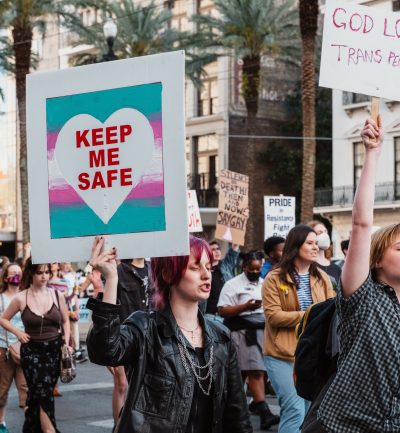This call to solidarity is a work in progress. We are collaborating with partner organizations to continue to edit this Call to Solidarity and then release it nationally along with some strategic offerings for those who want support in engaging in concrete action.
* * * * *
For over three decades, progressive churches have labored to include LGBTQ+ people in their spaces. They aspire to be Open and Affirming (or denominational equivalent) congregations—offering safety and acceptance in a spirit of hospitality and inclusion. Some have taken this work further, cultivating communities where LGBTQ+ people aren’t merely accepted, but celebrated for our gifts, including gifts of leadership. This has been powerful and important work.
We believe the Spirit is calling the Body of Christ to engage this work even further. We believe it is time for churches to shift from a posture of welcome and celebration to solidarity.
Solidarity is love in action. It is joining together in a common struggle. Now is the time for the Body of Christ to enter into the struggle that LGBTQ+ face in our society.

We acknowledge that the Body of Christ is made up of both cisgender heterosexual (cis/het) people and LGBTQ+ people. We also acknowledge that, within most Christian institutions and communities, cisgender heterosexual people hold most of the power and privilege.
We believe the weight of this call to solidarity in proportion to the power and privilege held within our society.
We believe keeping LGBTQ+ people as a theological issue to be discussed and affirmed (or not) keeps them in bondage to cis/het normativity—something foundational to most Christian traditions.
We believe it is time for people of faith to confront the forces that seek to disenfranchise and dehumanize LGBTQ+ people, both within our churches and without.
LGBTQ+ people, especially transgender women of color, experience disproportionately high rates of homelessness, suicide, homicide, unemployment, and discrimination. A significant amount of this is motivated by religious conviction.
In recent months, dozens of states have begun restricting the rights of LGBTQ+ people with a surge of new legislation. Many of these laws target trans people in particular. These include limitations placed upon the power of local governments to pass their own nondiscrimination protections, bans or restrictions on the ability of school districts and teachers to develop curriculum that acknowledges the legitimacy of LGBTQ+ people, criminalization of gender-affirming healthcare for minors, laws forcing students to file birth certificates to prove their gender, laws restricting transgender students access to athletic programs and bathrooms that match their gender identity, and more. Similar bills are being introduced at the federal level. Meanwhile, federal courts are supporting the rights of teachers to misgender students. And the Supreme Court may overturn the right to same-sex marriage.
This surge of anti-LGBTQ+ legislation is fueled by a particular moral vision informed by a particular understanding of faith.
As social evil grows, we put our faith in the power of the Spirit to build something new. As oppression looms, we find hope in movements for justice. As representatives of the Body of Christ, we bear witness to that faith and hope by taking bold action, motivated by love.
Therefore, we invite representatives from congregations, denominations, and other faith-based organizations to join us in the following commitments:
